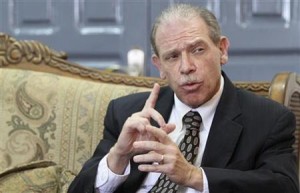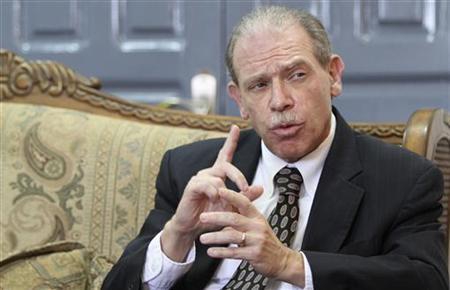 (Reuters) -�Iran�is working with southern secessionists in Yemen to expand its influence and destabilize the strategic region around the Straits of Hormuz, the U.S. envoy to Yemen was quoted as saying on Sunday.
(Reuters) -�Iran�is working with southern secessionists in Yemen to expand its influence and destabilize the strategic region around the Straits of Hormuz, the U.S. envoy to Yemen was quoted as saying on Sunday.Yemen's state news agency Saba cited U.S. Ambassador Gerald Feierstein as accusing�Iran�of supporting south Yemeni leaders trying to revive the formerly independent state of South�Yemen, and naming Ali Salem al-Beidh, who runs a pro-independence satellite TV station from Lebanon, as one of them.
"There is evidence that proves Iran's support to some extreme elements of the southern movement (al-Hirak)," Feierstein was quoted by Saba as saying in remarks reported in Arabic.
"Ali Salem al-Beidh resides in Beirut and receives financial support from the Iranian government. We have no doubt that he is responsible for efforts to foil the Gulf initiative (for democratic transition in Yemen) by supporting the calls for secession."
Yemen is grappling with al Qaeda militants and Shi'ite Muslim rebels in the north as well as the southern separatists. Its location flanking top oil producer�Saudi Arabia�- Iran's Sunni Muslim regional adversary - and major shipping lanes have made restoring its stability an international priority.
Yemen's Gulf neighbors, led by�Saudi Arabia, sponsored a deal that saw veteran strongman Ali Abdullah Saleh step down last February after a year of protests and allowed his deputy, Abd-Rabbu Mansour Hadi, to take office.
The power transfer deal mandates Hadi to oversee reforms during a two-year interim period to ensure a transition to democracy, including amending the constitution and restructuring the armed forces to break the Saleh family's grip.
The process is expected to lead to�presidential�and parliamentary elections in 2014.
But efforts to convene a national reconciliation dialogue central to reform have met resistance from some south Yemeni separatist leaders such as Beidh.
Beidh failed in a civil war in 1994 to reverse the unification of north and south Yemen four years earlier.
Most of Yemen's fast-declining oil reserves are in the south, but many southerners complain that northerners in the�capital�Sanaa have discriminated against them and usurped their resources. The central government denies any discrimination.
Yemeni officials have also accused Iran of backing the Shi'ite Houthi rebels who operate in northern Yemen. Iran denies any interference in Yemen's affairs.
By Reuters
The Iran Project is not responsible for the content of quoted articles.











